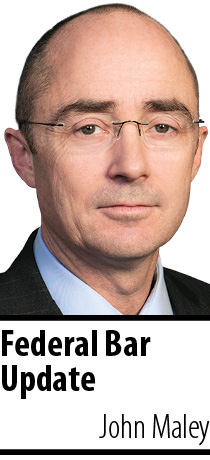Subscriber Benefit
As a subscriber you can listen to articles at work, in the car, or while you work out. Subscribe Now Effective Dec. 1, a package of federal rule changes is scheduled to go into effect. Per federal statute, the amendments apply to cases filed on or after Dec. 1, and otherwise to existing cases to the extent just and practicable.
Effective Dec. 1, a package of federal rule changes is scheduled to go into effect. Per federal statute, the amendments apply to cases filed on or after Dec. 1, and otherwise to existing cases to the extent just and practicable.
Notably, there are no changes this year to the Federal Rules of Civil Procedure. The Appellate Rules have the most proposed changes — 10 in total. But all the changes are nonsubstantive, dealing with service and corporate disclosure statements. Changes to four bankruptcy rules will also take effect.
A significant rewrite of Federal Rule of Evidence 807 will take effect. Rule 807 is the residual exception rule to hearsay (formerly found at Rules 803(24) and 804(b)(5). It is one of the most important Rules of Evidence, yet is overlooked or not well-known.
The revised rule will read as follows:
Rule 807. Residual Exception
(a) In General. Under the following circumstances conditions, a hearsay statement is not excluded by the rule against hearsay even if the statement is not specifically covered by admissible under a hearsay exception in Rule 803 or 804:
(1) the statement has equivalent circumstantial is supported by sufficient guarantees of trustworthiness — after considering the totality of circumstances under which it was made and evidence, if any, corroborating the statement; and
(2) it is offered as evidence of a material fact;
32) it is more probative on the point for which it is offered than any other evidence that the proponent can obtain through reasonable efforts; and
(4) admitting it will best serve the purposes of these rules and the interests of justice.
(b) Notice. The statement is admissible only if, before the trial or hearing, the proponent gives an adverse party reasonable notice of the intent to offer the statement and its particulars, including the declarant’s name and address, — including its substance and the declarant’s name — so that the party has a fair opportunity to meet it. The notice must be provided in writing before the trial or hearing — or in any form during the trial or hearing if the court, for good cause, excuses a lack of earlier notice.
According to the official comments, the rule is amended “to fix a number of problems that the courts have encountered in applying it.” The committee explained: “Courts have had difficulty with the requirement that the proffered hearsay carry ‘equivalent’ circumstantial guarantees of trustworthiness. The ‘equivalence’ standard is difficult to apply, given the different types of guarantees of reliability, of varying strength, found among the categorical exceptions (as well as the fact that some hearsay exceptions, e.g., Rule 804(b)(6), are not based on reliability at all). The ‘equivalence’ standard has not served to guide a court’s discretion to admit hearsay, because the court is free to choose among a spectrum of exceptions for comparison. Moreover, experience has shown that some statements offered as residual hearsay cannot be compared usefully to any of the categorical exceptions and yet might well be trustworthy. Thus the requirement of an equivalence analysis has been eliminated.”
Separately, the comments explain: “The amendment specifically requires the court to consider corroborating evidence in the trustworthiness enquiry. Most courts have required the consideration of corroborating evidence, though some courts have disagreed. The rule now provides for a uniform approach, and recognizes that the existence or absence of corroboration is relevant to, but not dispositive of, whether a statement should be admissible under this exception. Of course, the court must consider not only the existence of corroborating evidence but also the strength and quality of that evidence.”
Regarding notice, amended Rule 807(b) has four key changes. First, the proponent must disclose the “substance” of the statement. Second, the prior requirement that the declarant’s address must be disclosed has been deleted. The comments note that the prior requirement “was nonsensical when the declarant was unavailable … .” Third, the amendment requires that the notice be in writing (which is satisfied by electronic form). Fourth, the notice provision now includes a good cause exception, which gives the court discretion for “the proponent may not become aware of the existence of the hearsay statement until after the trial begins, or the proponent may plan to call a witness who without warning becomes unavailable during trial, and the proponent might then need to resort to residual hearsay.”
In closing, Rule 807 can be the last pathway to admissibility. It should be considered at all stages of litigation, and the amendments make it a more practical and useful rule.
Save the date — The annual Federal Civil Practice Seminar will be held on Friday, Dec. 20 from 1:30-4:45 p.m. in Indianapolis. Registration and further details will be available at www.theindianalawyer.com.•
• John Maley — [email protected] — is a partner with Barnes & Thornburg LLP, practicing federal and state litigation, employment matters and appeals. He clerked for Judge Larry McKinney from 1988-90.
Please enable JavaScript to view this content.
